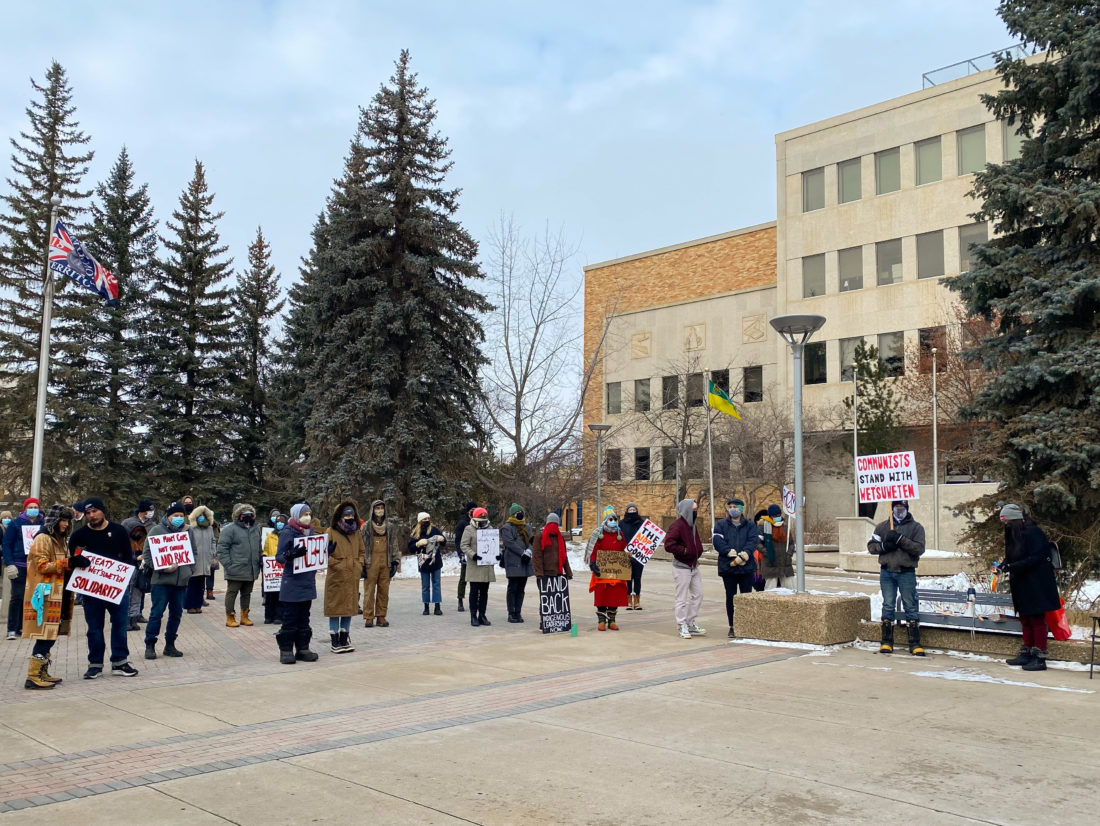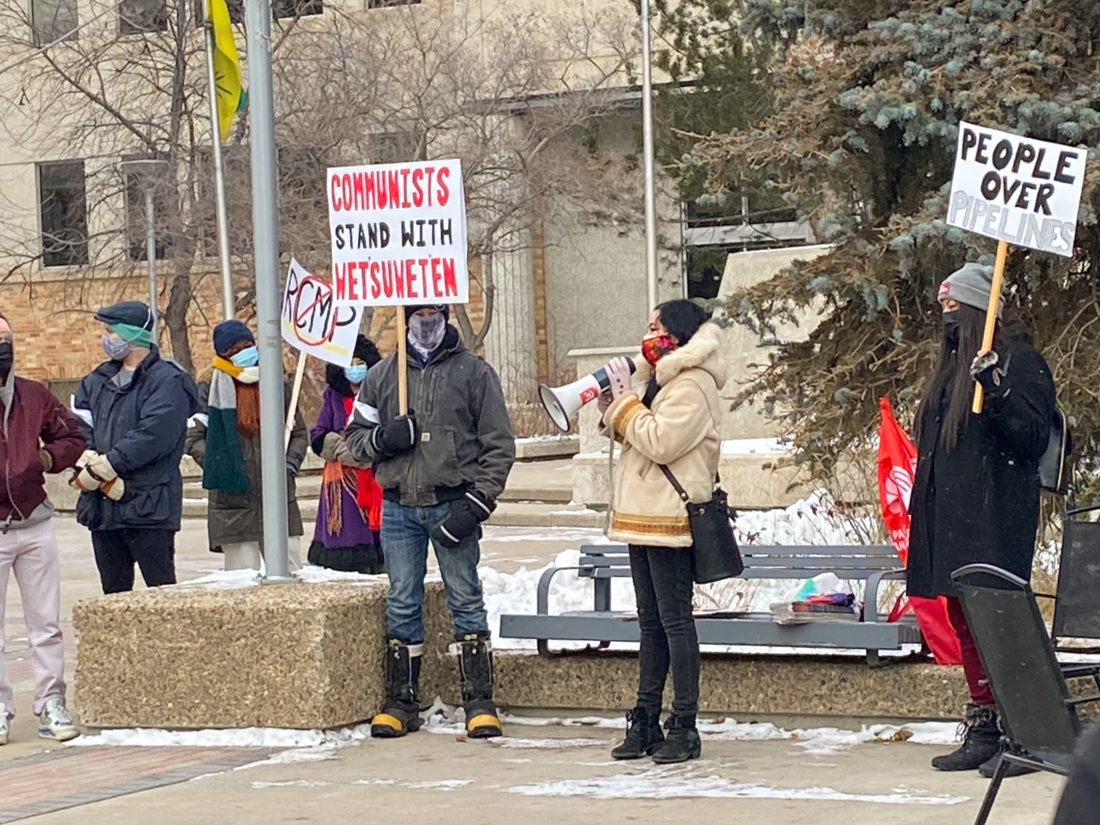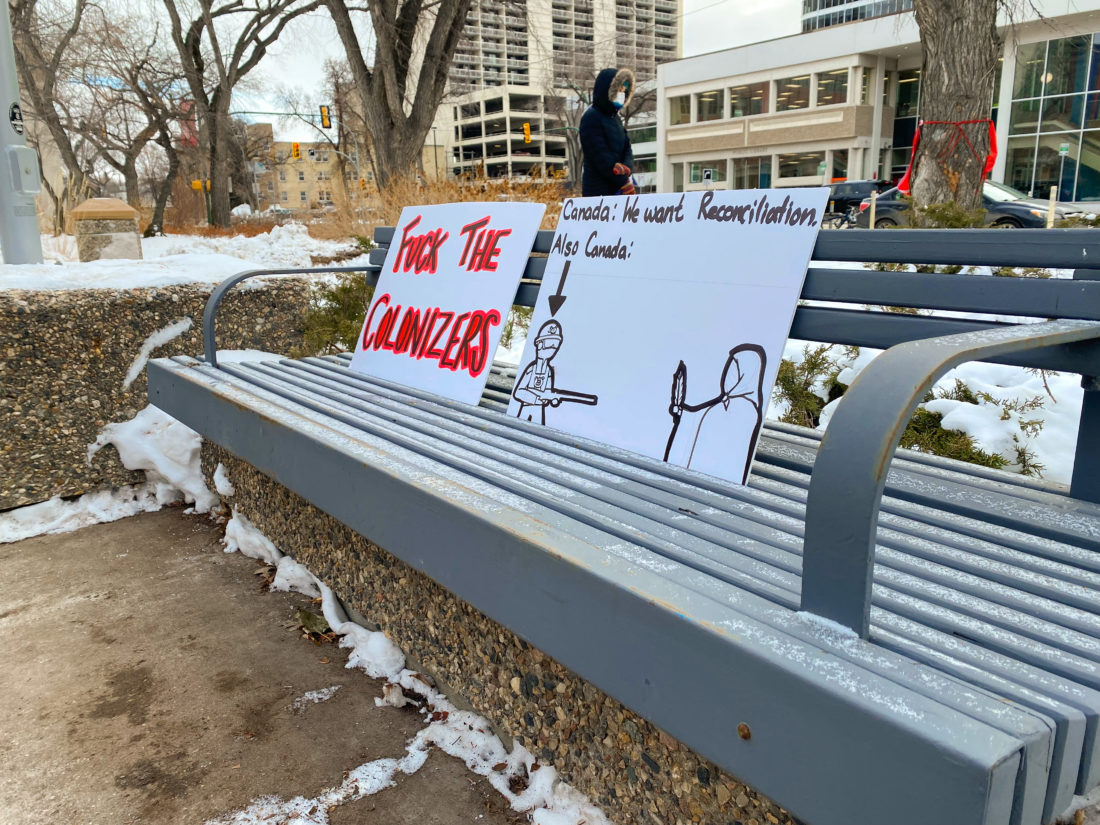
On Nov. 24, Saskatoon residents gathered in front of City Hall to show support for Wet’suwet’en land defenders and protestors of the Coastal GasLink pipeline.
The Saskatoon rally was one of several demonstrations held across Canada over the last week following the arrest of several people by the RCMP during a two-day raid of a CGL pipeline blockade in Wet’suwet’en First Nation territory in the B.C. interior. A Nov. 20 press release from the Gidimt’en clan territory where the raid occurred counts 32 total arrests. The arrests have renewed controversy surrounding the pipeline, which would transport natural gas 670 km across Northern B.C.
The pipeline would cross the Wet’suwet’en’s unceded territory — land belonging to First Nations people that has not been acquired by the Crownthrough treaties.
The Louis Riel Communist Party Club, Black Lives Matter Saskatoon and Indigenous Joint Action Coalition partnered to organize the event. Speakers underlined the importance of showing support for Wet’suwet’en land defenders wherever possible.
“I just think that every place needs people to band together to help them because it is incredibly important to me,” said Ashley Shingoose, a member of the Louis Riel Communist Party Club.
Kammy Alexson, a Saskatoon-based Indigenous artist, attended the rally feeling it was important to offer support from all parts of Canada.

“I wanted to show up for our relations all across Turtle Island, especially in Wet’suwet’en,” Alexson said.
Wednesday’s rally also garnered the support of University of Saskatchewan students, including the University of Saskatchewan Students’ Union Pride Centre.
“This is a critical rally, one that stands for not just Indigenous peoples, but for the climate crisis which affects all of us and is decimating British Columbia as we speak,” wrote the USSU Pride Centre in an Instagram post.
In her speech to the crowd, Erica Violet Lee, a writer and organizer for the rally, empathized with those experiencing exhaustion from continually fighting for Indigenous rights.

“I’m thinking about all of my relatives in Wet’suwet’en territory who are putting their very bodies on the line, not because they want to, not because that’s our biological imperative as Indigenous people … but because they have to,” Lee said.
Opposition to the CGL pipeline stems from ecological concerns for the safety of wildlife, fisheries, and water and air quality in Wet’suwet’en territory.
The Wet’suwet’en are composed of five clans, including the Gidimt’en. These clans are governed by a common group of hereditary chiefs, a system that predates colonialism. The Indian Act, however, only recognizes the authority of elected chiefs, and not that of hereditary chiefs.
While elected chiefs have approved the CGL pipeline proposal, hereditary chiefs of all five Wet’suwet’en clans have unanimously opposed it. This has led to a series of blockades and protests that began in 2018.
According to a Nov. 22 press release from the Gidimt’en Checkpoint, an access point to the clan’s territory, stated that one of their spokespersons, Sleydo’, was among those arrested and was asked by CGL to prove her Wet’suwet’en identity with documentation.
The checkpoint’s media coordinator called the attempted legal strategy of justifying Sleydo’s arrest by disproving her Wet’suwet’en identity “colonial gendered violence.”
Participants at the Saskatoon rally also denounced the request for proof of Sleydo’s bloodline.
“Our colonial courts are demanding blood quantum in release conditions for the sake of pipelines that will decimate this land,” Shingoose said to the crowd.
Footage released by CBC journalist Michael Toledano, one of the people arrested at theGidimt’en Checkpoint, shows RCMP officers using an apparent excessive use of force in carrying out the arrests by breaking into a cabin with a chainsaw and aiming firearms at the occupants.
Lee told the crowd of community members, activists and students gathered in the Saskatoon cold that “every little bit of solidarity counts.”
“The battle that I see here that we’re fighting [is] our poverty, incarceration, police brutality. And they still expect us to sit down with gas and oil and pipeline companies and have reconciliation discussions,” Lee said.
“[Wet’suwet’en has] been battling this war with the RCMP for years… and I know people who have been directly affected by this and I’ve stood with them across Turtle Island,” Alexson said.
“It’s important to stand with them wherever I go.”
—
Sandra LeBlanc | News Editor
Photos: Sandra LeBlanc | News Editor
Leave a Reply